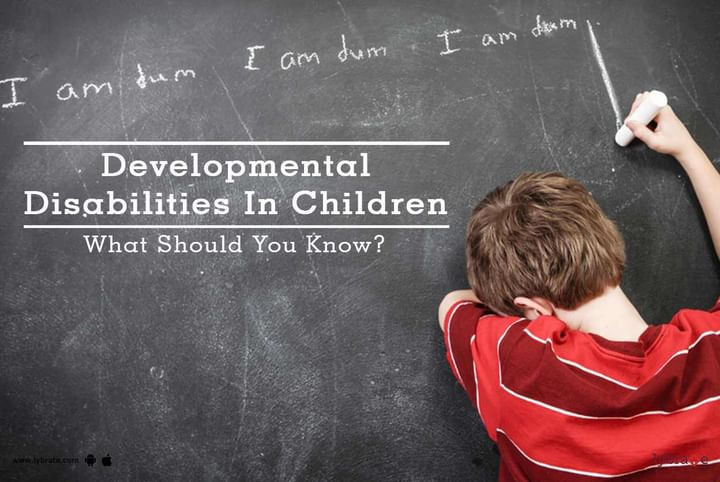Developmental Disabilities In Children - What Should You Know?
Development disabilities can be defined as chronic conditions which develop when the brain of a child is still forming. Developmental disabilities may occur during pregnancy or early childhood or they may occur anytime till a person attains the age of twenty two. They are birth defects which may hamper the proper functioning of a body part or a body system. Most of the developmental disabilities cannot be medically treated, however with therapy their symptoms can definitely be controlled.
Nervous System Disabilities:-
As the name suggests, nervous system disabilities affect the functioning of the nervous system, spinal cord as well as the brain. A child with nervous system disabilities is most likely to suffer from speech disorders, behavioral disorders, movement disorders and may experience convulsions. His learning, understanding and intelligence, might all be affected due to nervous system disabilities.
Attention Deficit Hyperactivity Disorder (ADHD):-
Attention Deficit Hyperactivity Disorder can be identified in children by their inability to concentrate, being forgetful and feeling hyperactive all the time. There are a number of ADHD causes such as changes or malfunctioning of certain brain structures, parents suffering from hypertension or a psychiatric disturbance, chemical poisoning, alcoholism, smoking or drug abuse by the woman when she is pregnant and lastly, exposure of the child to certain environmental toxins like lead, polychlorinated biphenyls, etc.
Autism:-
Another example of nervous system disabilities is autism. Various behavioral and speech disorders may be caused in a child due to autism. Although exact cause of autism is not known, still some researchers are of the opinion that it may be caused due to certain genetic, environmental and neural development factors. Differences in the brain chemicals, known as neurotransmitters are the main cause behind autism. Environmental factors such as exposure to certain chemicals, exposure to drugs, eating certain kind of foods can exacerbate this condition.
Cerebral Palsy:-
Most cases of cerebral palsy develop even before the child is born. Very rarely does it occur during childbirth, although if the baby is premature or is under weight and suffers from intraventricular hemorrhages, it can lead to development of this condition in him. But mostly this condition develops when the brain development of the unborn child is affected when the mother is alcoholic, smokes, takes drugs, is malnourished, is exposed to certain chemicals or suffers any mental of physical trauma when she is pregnant. Some other reasons for a child to develop cerebral palsy are any injury to the brain due to accident, asphyxia, bacterial infections such as encephalitis or exposure to certain chemicals and allergies.
Bipolar Disorder:-
The reason why this disorder develops in a person is not known, still studies have shown that it is hereditary and runs in families. A person suffering from bipolar disorder experiences four kinds of mood cycles - mania, hypomania, depression and a mixed episode. Typical symptoms range from a person feeling highly energetic to falling into deep depression, leading to development of suicidal thoughts.
Dyslexia:-
Dyslexia is a neurological disorder that makes a child incapable to understand language, differentiate between right and left, solve mathematical problems and lastly, organize and plan anything. This condition is caused when the brain is unable to transfer images it receives from the eyes and ears into comprehensible language.
Dyscalculia:-
This is another disability that is closely associated with dyslexia. In this condition, a child is unable to recognize numbers and thus can't solve mathematical problems. This condition is caused due to an injury to the brain or a deficit in the working memory. Inability to read maps and follow directions are some other consequences of dyscalculia.
Dysgraphia:-
A child suffering from Dysgraphia is unable to write alphabets or sentences in order. Dysgraphia symptoms develop in a child when his motor development does not take place properly.
Fragile X Syndrome:-
Fragile X syndrome occurs when FMR-1 gene/protein is unable to participate as required for the healthy and normal development of the offspring, resulting in numerous changes in his emotional, mental, physical and behavioral features.
Down Syndrome:-
Down syndrome is a chromosomal disorder caused due to an extra 21st chromosome, resulting in mental retardation as well as malformation in a newly born child.
Metabolic Disorders:-
These birth defects affect the body's metabolism i.e. the processes involved in building up, breaking and assimilating the materials required by the body to function properly. Phenylketonuria and hypothyroidism are examples of a metabolic disorder which can cause intellectual and developmental disabilities.
Phenylketonuria:-
Phenylketonuria, a genetic disorder, occurs when the body is unable to process the phenylalanine (Phe) protein found in almost all kinds of foods. If the Phe level becomes very high, the brain of the child can get damaged and he may even suffer from mental retardation.
Hypothyroidism:-
Another example of metabolic disorders is a hormonal condition known as Hypothyroidism. In this condition, the thyroid gland is unable to produce some very important hormones. If this disorder is not treated in time, it can lead to obesity, infertility, joint pain and even heart disease.
Sensory-related Disabilities:-
Sensory-related disabilities, a major part of the development disabilities list, are those which can cause problems related to sight and hearing. Some examples of sensory related disabilities are Williams syndrome and congenital rubella syndrome.
Congenital Rubella Syndrome:-
Congenital rubella syndrome is caused when the rubella virus negatively affects the fetus, mostly during the first trimester of pregnancy. A child who has congenital rubella might be deaf and may even have cataracts in the eye.
Williams Syndrome:-
Williams syndrome is a condition which occurs when some of the genes might be missing in a newborn child. Some of the symptoms of this rare condition are learning disorders, sensitivity to loud music, attention deficit disorder, sunken chest and feeding problems such as vomiting or reflux.
Degenerative Disorders:-
Degenerative disorders usually develop at an older age and the newborns who suffer from such disorders may show no signs at all. Degenerative disorders are known to cause physical, sensory and mental defects in a person. An example of degenerative disorder is Rett syndrome.
Rett Syndrome:-
Mostly girls suffer from this disorder. In the initial stages, the sufferer displays normal growth patterns but later there will be slowing down of brain growth, inability to use hands properly, problems in walking, slow mental growth and the sufferer may experience seizures.



+1.svg)
